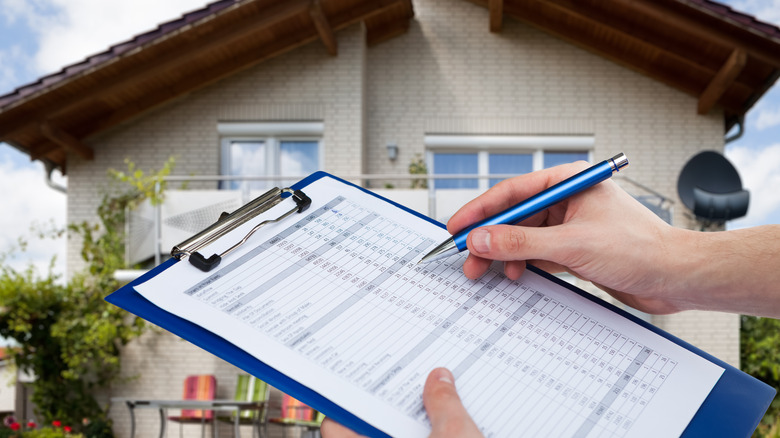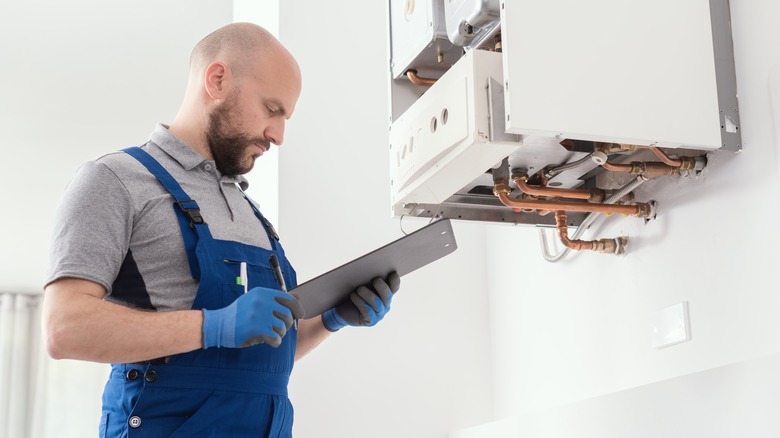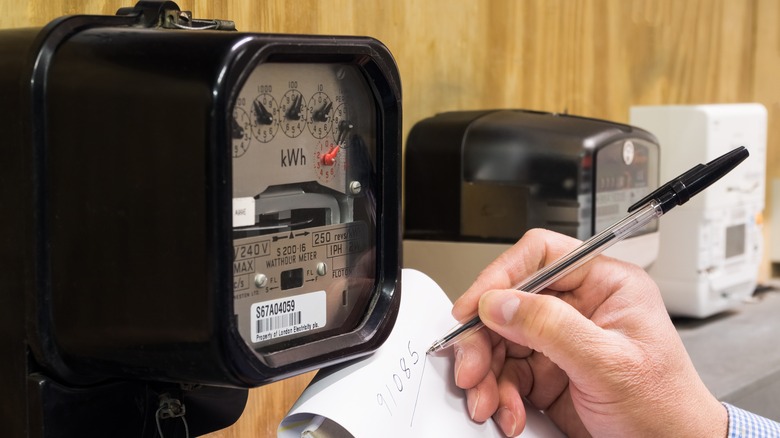What You Should Do Before Closing On A House
When you're in the market for a new home, there are several financial, logistical, and personal things to consider before making an offer. According to FortuneBuilders, some key financial factors can include your current debt-to-income ratio, mortgage rates, your monthly budget, your current job security, and the amount of money that will be needed for the down payment. The Mortgage Reports shares additional factors that can impact whether a given home is right for an individual or family, including the location, the amenities of the neighborhood, the size of the property, the covenants, bylaws, and representation of the homeowners association (if applicable), and the quality of the local schools.
Once you've taken all of these considerations into account, found the right home that checks all of your boxes, and have a ratified contract, it can feel both exciting and stressful thinking about everything that needs to happen before you close on your home and can move into it. Forbes Advisor notes that the average closing time when taking out a mortgage on a home is generally between 30 and 60 days. While this may seem like a long time, there are several things you'll want to do and prepare before you sign on the dotted line. Read on to learn more about how to prepare for the closing of your new home.
Apply for a mortgage loan
Once your offer on a home is approved, you'll need to apply for a mortgage loan. Bank of America notes that the process for applying for a loan can vary based on the lender. Some may require in-person applications, while others may accept, or even encourage, online or phone applications. Lenders will need to verify your employment history and assess your financials before approving you for a loan. You need to have six things ready before initiating a meeting with a lender. These include your most recent pay stubs proving you're employed, W-2s covering the last two years, copies of your tax returns, two months' worth of all of your banking and investment statements, your most recent quarterly profit/loss statement (only applicable for self-employed individuals), and a copy of the Purchase and Sales Agreement for your soon-to-be new home.
As your lender works on your application, they may contact you for additional documentation or information. It is essential to provide your lender with accurate information and bring up any credit issues. Failing to do so could delay the approval of your loan, or even cause you to be declined. Another important aspect of the loan application process that you may want to consider is locking in the interest rate. If rates are likely to increase before your closing date, request a rate lock, which guarantees the current interest rate for a set amount of time. To learn more about current interest rates and whether a rate lock would be a good idea for your specific situation, ask your lender.
Confirm that the title is clear
Bankrate explains why it is so important to confirm that a property has a clear title before purchasing it. A clear title means that the home does not have any liens, easements, boundary disputes, or other issues that may prevent the seller from actually being able to sell it to you. Also called a clean title, a clear title means that the person stating to be the property owner is actually able to sell it to you legally.
There have been instances when buyers purchased a home, only to soon discover that the seller wasn't actually legally allowed to sell it. Clearly, this would open up a whole host of other issues that nobody wants to deal with. In addition to avoiding all of the undesirable side effects of not having a clear title, it will also be required to obtain a mortgage and home insurance for the property, so this isn't a step you'll want to skip before closing on your new home.
Schedule a home appraisal
Before you'll be able to go to closing, Rocket Mortgage explains that the home will need to be appraised to assess its fair market value. Receiving an appraisal for a home can give you confidence that the price you agreed to pay is not significantly higher than the home's actual value. Lenders will also require an appraisal. Assurance Financial shares, most lenders will only approve the buyer for a mortgage that matches the value of the appraisal. This means that you will need to cover the difference if the appraisal comes in below the price agreed to in your contract.
For this reason, many real estate agents recommend adding an appraisal contingency when making an offer on a home. With this contingency, you have the option to break the contract if the appraisal is lower than the purchase price. If you're buying a home with cash and not relying on financing from a lender, an appraisal isn't always necessary. However, you may still want to request one to confirm that you aren't overpaying for the home.
Schedule a home inspection
Home inspections are an important part of the home-buying process. As Investopedia explains, during a home inspection, a qualified inspector assesses the state of the property and if it has any issues. The inspector will examine the home's plumbing, electrical, and heating and cooling systems, check for any safety concerns, look for signs of damage caused by fire or water, and note any other areas of concern to share with the prospective owner.
Super Inspection Pros explains several benefits of scheduling a home inspection. One advantage is decreasing the odds of buyer's remorse. Your home inspector will point out repairs and other problems that need your attention shortly after moving in and over the next few years, such as replacing the roof or fixing a leak. This will allow you to prepare for these repairs, rather than being surprised when they pop up after you move in.
A home inspection can also give buyers some bargaining power. If the review turns up a lot of costly repairs, your real estate agent may be able to help you negotiate a lower purchase price or get the sellers to complete some of the repairs for you. If the seller is unwilling to address these issues (or you just don't want to deal with them), you can walk away from your contract if it has a home inspection contingency.
Getting a home inspection can also give you peace of mind that you aren't buying a lemon home. You can't really put a dollar figure on the ability to breathe easily and have confidence when making such a large purchase.
Schedule a pest inspection
You may assume that a pest inspection would be included with a home inspection. However, as Policygenius points out, they are actually two different things. While a home inspector may note visible damage, they won't be able to provide you with the full range of information that a qualified pest inspector will be able to. Rocket Mortgage takes a deeper look at what a pest inspection is and why prospective home buyers should schedule one before finalizing the purchase of a new home. The inspector will assess the property and look for any living bugs and/or signs of damage to the property. Checking for termites or signs of previous damage, for example, is one important component of a pest inspection.
Some of the other pests that inspectors will look for include bedbugs, cockroaches, carpenter ants, snakes, mice, and other rodents. Of course, the location of the property and the types of pests found in that area will help guide the inspection. Even if there are no problematic pests on the property, that doesn't necessarily mean there is no pest damage. There could have been a prior infestation that the current or previous owners exterminated. This is why the inspector will also look closely for signs of damage along the foundation, siding, walls, baseboards, and floorboards.
Negotiate repairs with seller
If the home inspection or pest inspection brings up any repairs or safety issues, now is the time to negotiate with the seller. Raleigh Realty suggests reviewing the inspection report and coming up with a list of items you would like the seller to repair. Categorize the items into three groups to help you prioritize what to ask for. These categories include deal-breaking and costly issues, minor repairs that are still a bit costly, and minor or inexpensive repairs. Focus on the more major projects rather than the minor ones when coming up with the list of repairs you want the seller to complete.
Next, contact a contractor (or the appropriately qualified company) to provide a quote for each of the repairs you want to request. After receiving quotes, discuss with your realtor whether it would be better to ask the buyer to complete the work or provide a credit at closing. In many cases, requesting a credit may be the better option. With a credit, you can oversee the work done yourself once you buy the house. This way, you can ensure that it is done to your standards.
Now you're ready to start the negotiation process with the buyer. Your realtor will serve as the middleman for these negotiations and present them to the seller's realtor. Finalize exactly what you're asking for and wait for the seller's response. They may accept your request, come back with a counteroffer for fewer repairs or a smaller credit, or refuse to negotiate at all. If they do not accept your offer, you can move forward with the purchase as outlined in the initial contract, or you may choose to walk away.
Line up homeowner's insurance
According to Progressive, your lender will require proof that you have obtained homeowners insurance before finalizing your loan. Taking some time to compare insurance companies and find the one that offers coverage to match your needs and budget is important. Once you have a contract in place and know the address of the policy, you can begin your search for the best policy. Starting early will give you sufficient time to receive and compare multiple quotes.
Progressive outlines three important things to consider when shopping for an insurance policy. First, it recommends learning about each policy's limits on liability and personal property coverage. Each policy may have different liability coverage, and it is designed to protect you in the event you are legally responsible for injuries sustained on your property. In most cases, the maximum liability limit is $500,000, but you can supplement that with an umbrella policy to obtain additional coverage. The personal property coverage is exactly what it sounds like: coverage for your personal items like electronics, jewelry, housewares, and clothing.
The next item to check for when comparing policies is exclusions. For example, earthquakes, flooding, or landslides will be excluded from a standard homeowners policy in some areas. If this is the case for you, you'll want to be prepared to shop for an additional policy to cover exclusions that could impact you. For example, if you live in an area likely to be affected by hurricanes, you may want to add separate flood insurance.
Finally, understand your deductibles. The deductible is the amount you'll be responsible for paying should you make a claim. Depending on your budget and financial situation, a policy with a high deductible may not be the right fit.
Gather funds to cover closing costs and your down payment
In addition to the down payment for your home, you'll also have to cover the closing costs associated with the purchase. While these can vary, closing costs typically include the first year of your homeowner's insurance, the property tax bill for the first six months, fees to cover loan processors, and points you paid to secure a lower interest rate (if applicable).
Your lender will provide you with more information about the specific closing costs you'll need to cover. However, you may not receive the exact number until you get closer to the actual closing day. To prepare for these costs, budget between 2% and 5% of the cost of the loan.
There are a few different options for paying closing costs. You can pay from a personal account (checking or savings). If you plan to pay this way, take note that it is required that the money is in the account for a minimum of 60 days before finalizing a contract. Monetary gifts from family — that have been documented with a Gift Letter — can also be used to cover closing costs.
If you don't have cash on hand — or money from family — you can talk to your lender to determine whether the fees can be rolled into your mortgage payment. While this isn't the most ideal choice because you'll pay interest on the sum, it can help those who don't have enough money to cover the fees or want to save their cash to handle necessary repairs or other costs associated with moving. Requesting a seller credit with your initial offer on the house is another option to consider. Sellers are more likely to accept these offers in a buyer's market than in a seller's market.
Arrange for the utilities to be transferred
As your closing date is approaching, you'll want to arrange to have the utilities transferred to your name and set the service to turn on when you move in. Moving.com recommends making a master list with phone numbers for all utility providers you need to contact. There may be a few options for each utility, but in some cases, there will only be one provider available. If multiple providers are available, compare rates and service plans and seek recommendations to help you decide which one will be the best fit for you.
Starting approximately two or three weeks before you're scheduled to close on the property and move in, contact each utility service provider to make arrangements. If you're sticking with any of your current providers, you can set it up to transfer your account to the new property and discontinue service at your current address. If you're switching to a new provider, you'll need to contact both your current provider and the new company to discontinue existing services and start new services. During these conversations, provide the new address for final and new bills.
Before you move to your new home, make sure your payments for your current utilities are all current. You don't want to harm your credit score by having unpaid balances. Finally, before you move out of your current property and into your new one, arrange for the utility company to perform a final meter reading, when applicable. This will help you fight any surprise bills from showing up in a few weeks.
Review the closing disclosure
According to Rocket Mortgage, lenders must present buyers with a Closing Disclosure at least three days before the closing date. Taking time to read over this disclosure form closely is essential. At closing, you'll have to sign and say that you agree to the terms of the loan; if you haven't read through the Closing Disclosure, you could end up signing something that doesn't actually match what you want.
The five-page Closing Disclosure document outlines the key components of your loan. These include the purchase price for the property, the interest rate you'll be charged, an estimate for the real estate taxes, insurance costs, closing costs, lender and loan fees, and more. You can compare these figures with those on the loan estimate you initially received from your lender and make sure that nothing has unexpectedly changed. If you have questions about the Closing Disclosure or don't understand something you read, reach out to the lender or your realtor for assistance.
Complete a final walk-through of the property
Shortly before your closing date, you'll conduct a final walkthrough of your soon-to-be new home. Ramsey Solutions notes that the final walkthrough is a buyer's last opportunity to check on the property and confirm that everything looks as it should before they officially purchase the home at closing. Set aside a few hours for the walkthrough to give yourself sufficient time to go through each room of the house and walk around the exterior.
During the walkthrough, check to ensure that any repairs the seller agreed to make have been properly completed. You should also check the appliances, faucets, toilets, outlets, light fixtures, doors, windows, and other essential components of the home to ensure that they are still in working order. Beyond assessing these details, the house should also be relatively clean. This doesn't mean it will necessarily be move-in ready, but there shouldn't be piles of trash or other debris left for you to deal with.
You'll want to gather a few key supplies and documents to prepare for your final walkthrough. These include a camera to photograph any areas of concern, a cell phone charger or a nightlight to use to test electrical outlets, and a pen, notebook, and sticky notes for writing down your thoughts or identifying items that still need to be addressed by the seller. You should also bring a copy of the home purchase agreement and home inspection report to help you confirm that the seller addressed any agreed-upon repairs.
Gather necessary documentation for closing
To avoid scrambling to get everything together on the day of your closing, take some time to get everything organized and ready beforehand. First Bank highlights some of the most important items and documents you'll need, but you should also check with your lender and realtor to make sure there isn't anything else you need to bring.
These essential documents include your photo ID, a copy of the purchase agreement, and proof that you have obtained insurance for the property. You will also want to have a certified or cashier's check to cover the closing costs and down payment. Also, ensure that your real estate agent or a lawyer will be present at the closing appointment. Having an experienced and knowledgeable representative with you when making such a big purchase is important. They can help you review documents before you sign them and can address last-minute questions that arise.












